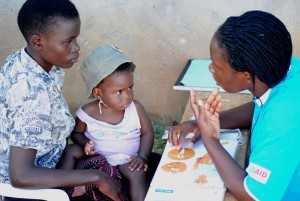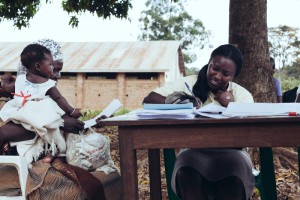Program Areas
 Increasing access to, coverage of, and use of comprehensive HIV & AIDS and TB services
Increasing access to, coverage of, and use of comprehensive HIV & AIDS and TB services
At health facilities and through a variety of community outreach strategies, STAR-EC is increasing access to HIV & AIDS and TB services including voluntary medical male circumcision (VMMC); promotion of HIV prevention through sexual risk reduction; HIV testing and counseling (HTC); prevention of mother-to-child transmission (PMTCT) of HIV; antiretroviral therapy (ART); tuberculosis testing and treatment; collaborative treatment of TB/HIV co-infected patients; and psychosocial support services. STAR-EC takes context-specific approaches to identify and reach most-at-risk populations (MARPs) and builds the capacity of community health workers to link people to care and ensure their treatment retention.
Strengthening decentralized HIV & AIDS and TB service delivery systems
STAR-EC builds the capacity of civil society organizations (CSOs) and local governments in each district to identify and respond to community need using quality data while continuously improving services and facilities through best practices in management. To this end, STAR-EC trains CSOs and local governments in strategic information collection and dissemination, including training in lot quality assurance sampling methodology. STAR-EC also facilitates district-led performance reviews to help identify coverage and service gaps. The program facilitates in-service clinical training and mentoring of health workers in the delivery of quality HIV & AIDS and TB services to improve human resources without disrupting service delivery. STAR-EC also provides injection safety and medical waste disposal at health facilities trainings as well as support for laboratory services, equipment, and supply chain management.
Improving the quality and efficiency of HIV & AIDS and TB service delivery within health facilities
STAR-EC works closely with facility staff, providing training and mentoring in quality improvement principles such as implementing action plans, improving data collection and use, and reporting. Service provision undergoes routine analysis and results are used to engage facilities in competitive improvement activities to correct program weaknesses. STAR-EC facilitates regular district-based collaborative learning sessions that allow quality improvement teams from each facility to share best practices.
Strengthening networks and referrals systems to improve access to, coverage of, and use of HIV & TB services
STAR-EC supports a network of village health teams (VHTs) that extends services, including PMTCT of HIV; HTC; VMMC; condom promotion; HIV prevention messaging; and care referrals, to communities. STAR-EC gives VHTs training and supplies, conducts regular performance reviews, and promotes linkages and referrals between the community and clinic. In collaboration with a network of civil society organizations, STAR-EC strengthens the care coordination structures for people living with HIV and helps expand services such as psychosocial support and livelihood development programs. STAR-EC supports CSOs by providing technical assistance and mentoring to improve their organizational capacity and fill service gaps.
 Increasing demand for comprehensive HIV & AIDS and TB prevention, care, and treatment services
Increasing demand for comprehensive HIV & AIDS and TB prevention, care, and treatment services
STAR-EC employs a range of targeted behavior change communication activities to increase public awareness and demand for HIV & AIDS and TB prevention and treatment services. Activities include the broadcast of a one-hour interactive radio show that promotes HIV prevention and dispels misinformation and stigma. STAR-EC distributes information, education, and communication materials and job aides to clients and health workers, respectively, to reinforce prevention and treatment messages. STAR-EC also organizes community awareness-raising events.
